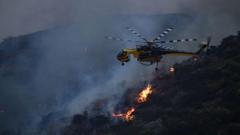As wildfires threaten Greece's tourism, residents and visitors brace for safety while grappling with climate impacts.
**Greece's Heart Melts Under Wildfire Threat Amid Heat Wave**

**Greece's Heart Melts Under Wildfire Threat Amid Heat Wave**
With summer heat waves unleashing wildfires, tourism faces a challenge as Crete's scenic beauty battles flames.
The Greek island of Crete is watching anxiously as wildfires threaten both lives and livelihoods during an extreme heat wave. This week, a fire broke out on the southeastern tip of the island, prompting a large-scale evacuation of over 1,500 people, primarily tourists. Fanouris Vatsinas, the owner of a local hotel, shared his distressing experience as the flames drew near before firefighters arrived to assist in his escape.
Repeated wildfires have become a distressing trend for Greece over the years, posing risks not just to life but also to the thriving tourism sector. Pictures of burning landscapes starkly contrast with the typical idyllic vacation photos associated with this picturesque region. The recent fire in Crete ignited Wednesday afternoon and rapidly spread through the rugged mountains surrounding the town of Ierapetra, fueled by intense dry conditions set off by a scorching heat wave affecting southern Europe.
Thankfully, reports indicate no major injuries or structural damage on the island. Given Crete’s vast size, the situation appeared less perilous than catastrophic fires in smaller Greek islands, which in the past have claimed numerous lives. For instance, a recent wildfire in Evros tragically resulted in 20 deaths, while a significant fire near Athens in 2018 claimed 104 lives.
Tourists like Kathy Kearns, a regular visitor from California, have adapted their travel plans, timing visits for cooler periods in a bid to dodge rising temperatures and wildfire threats. As Greece works to bolster resources against these natural disasters, the balance between tourism and environmental resilience hangs in the balance. With ongoing heat waves, vigilance will be crucial to protect both lives and the island's rich tourism appeal.
Repeated wildfires have become a distressing trend for Greece over the years, posing risks not just to life but also to the thriving tourism sector. Pictures of burning landscapes starkly contrast with the typical idyllic vacation photos associated with this picturesque region. The recent fire in Crete ignited Wednesday afternoon and rapidly spread through the rugged mountains surrounding the town of Ierapetra, fueled by intense dry conditions set off by a scorching heat wave affecting southern Europe.
Thankfully, reports indicate no major injuries or structural damage on the island. Given Crete’s vast size, the situation appeared less perilous than catastrophic fires in smaller Greek islands, which in the past have claimed numerous lives. For instance, a recent wildfire in Evros tragically resulted in 20 deaths, while a significant fire near Athens in 2018 claimed 104 lives.
Tourists like Kathy Kearns, a regular visitor from California, have adapted their travel plans, timing visits for cooler periods in a bid to dodge rising temperatures and wildfire threats. As Greece works to bolster resources against these natural disasters, the balance between tourism and environmental resilience hangs in the balance. With ongoing heat waves, vigilance will be crucial to protect both lives and the island's rich tourism appeal.



















